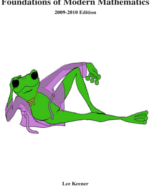Foundations of Modern Mathematics - Overview

Offering: Foundations of Modern Mathematics
Titles: Foundations of Modern Mathematics
By Dr. Lee Keener
Who should use "Foundations of Modern Mathematics"?
University mathematics majors in second year should have the mathematical maturity to succeed in a course based on this text. Physics or philosophy majors, who desire a rigourous introduction to number systems, mathematical reasoning, and proof techniques
What background is required?
It is best to have completed one or two courses in mathematics at the university level before using the text, but the formal prerequisite is modest: high school mathematics, especially algebra, and a little geometry.
Topic Coverage
The text is divided into two parts. The sections in the first part, which covers core topics, should be studied in the order given. There is more material in the first part than can normally be completed in a semester. The second part deals with a variety of special topics. With some exceptions, these topics are independent of one another. Many are quite challenging.
Part I. Informal set theory, proof techniques, induction, finite geometries, natural numbers, integers, elementary number theory, rational numbers, exponentiation, sequences, real numbers, complex numbers, sequences and series of complex numbers, fields, linear spaces, continuity and metric topology, differentiation, integration, the Fundamental Theorem of Algebra, countable and uncountable sets, irrational numbers.
Part II. Groups, rings and Euclidean rings, distribution of primes, Weierstrass Approximation Theorem, inner product spaces and Fourier series, graph theory, Brouwer’s Fixed Point Theorem, measure theory, geometric constructions, Euclidean and non-Euclidean geometry, non-standard analysis.
Appendices. Axiomatic set theory, reading in the literature, Greek alphabet.
Titles

Foundations of Modern Mathematics
ISBN: 978-0-9810756-8-6
By Dr. Lee Keener
